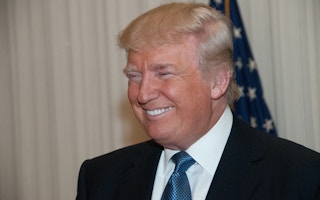The latest round of UN climate talks ended in Bonn, Germany, last week amid warnings that much more needs to be done so that countries deepen carbon cuts and raise cash for low carbon energy and adaptation to climate change.
Negotiators worked along three parallel tracks to flesh out the details of the Paris Agreement agreed last December, and refined a “rulebook” on how the pact will be implemented.
Yet outside the confines of the talks agenda, the prospect that the US elections in November might thwart commitments by the world’s second-biggest emitter caused ripples at the Bonn meeting.
Following confirmation that he had clinched the Republican nomination, billionaire property tycoon and reality TV personality Donald Trump re-iterated his threat to “tear up” the Paris Agreement.
“If the US government is implacably hostile to the Paris Agreement, it won’t help,” French climate diplomat Laurence Tubiana told journalists on the sidelines of the Bonn talks.
“But I don’t think it will derail it,” she added.
Some commentators have said Trump’s comments shouldn’t be taken too seriously and dismissed his threats as posturing.
Their argument goes that any effort by Trump to renegotiate the Paris Agreement is unlikely to have any tangible bearing, as other nations are likely to push ahead with their climate plans and develop low carbon industries regardless of what happens in Washington.
In addition, there is a strong groundswell for climate action in many US cities, states, and among hugely-powerful finance and technology companies.
The Republican nominee has also been accused of hypocrisy after environmental consultants hired by his property empire applied for planning permission for a protective wall for one of Trump’s golf courses in Ireland, citing rising sea levels because of climate change.
Despite the sanguine view at this week’s climate talks, there is a lingering fear among some that if Trump becomes president – an outcome that looks less unlikely according to opinion polls this week – then the implementation of key planks of US climate policy would become more difficult.
One of the main questions is this: If the US wasn’t able to deliver on its commitments, would major trading partners of the US to be so willing to impose carbon-related costs and curbs on their own industries?
The Clean Power Plan that limits CO2 emissions from power plants, drawn up by President Obama’s administration, would be under threat from a Trump presidency.
That’s because delays caused by court rulings, including one from the US Supreme Court, have prevented the plan’s implementation before November.
“
If the US government is implacably hostile to the Paris Agreement, it won’t help. But I don’t think it will derail it.
Laurence Tubiana, French climate diplomat
And it’s not just the US that is seen as a potential laggard because of pandering to the coal industry.
Japan, which hosted a G7 summit last week, came under fire from climate campaigners for a communique that did little to advance commitments on clean energy.
“The Ise-Shima Communique fell short of what’s needed on climate change,” said Jennifer Morgan, executive director of Greenpeace International.
“We’re glad to see the G7’s support for ratification of the Paris Agreement this year, but we expected a more ambitious response to the climate crisis, with specific details of how and when G7 leaders themselves intend to act,” she added in a statement.
Environmental NGOs said a meeting of the G20 in China later this year should try and make amends for weak commitments made at the Japan-hosted G7 summit.
Japan, like China, wants to use large amounts of coal in its energy mix in future decades, and Japan has been regarded as obstructive to moves for truly ambitious carbon targets.
However, there is optimism that China will be more open than Japan to use the global financial system to marshal funding for clean energy and low carbon technology.
“It’s up to China to tackle the toughest political questions head on, and lead the G20 to make public and private investment compatible with the Paris vision of limiting temperature rise to 1.5C,” the Greenpeace statement added.
Meanwhile, future UN climate talks will need to agree how to put the Paris Agreement into practice if countries are to deepen carbon cuts after a global “stock take” in 2018, and funnel the trillions of dollars needed for countries to use renewable energy and develop measures that will protect against extreme weather events.
Christiana Figueres, who steps down as UN climate chief in July, said countries were continuing to work collectively, but that a transition to clean energy wasn’t moving anywhere fast enough to avert the worst impacts of climate change.
Carbon cuts pledged by countries last year would put the world on a path to 3-4C warming, condemning many parts of the planet to runaway climate change, such as frequent and severe droughts, crop failures, sea level rises and powerful storms.
Around 180 governments have signed the Paris Agreement so far this year, but they now face the huge task of shifting away from fossil fuels and towards low-carbon and renewables in power generation, industry and transport.
Mohamed Adow, a climate adviser for Christian Aid, said that the next high-level UN climate talks in Marrakesh, Morocco, need to be seen as the “Renewables COP.”
That meeting, known as the Conference of the Parties, offers a major opportunity “to shift the conversation to actions that would keep the agreed temperature goals of 1.5C and 2C within reach,” said Adow.
This story was originally published by chinadialogue under a Creative Commons license.










